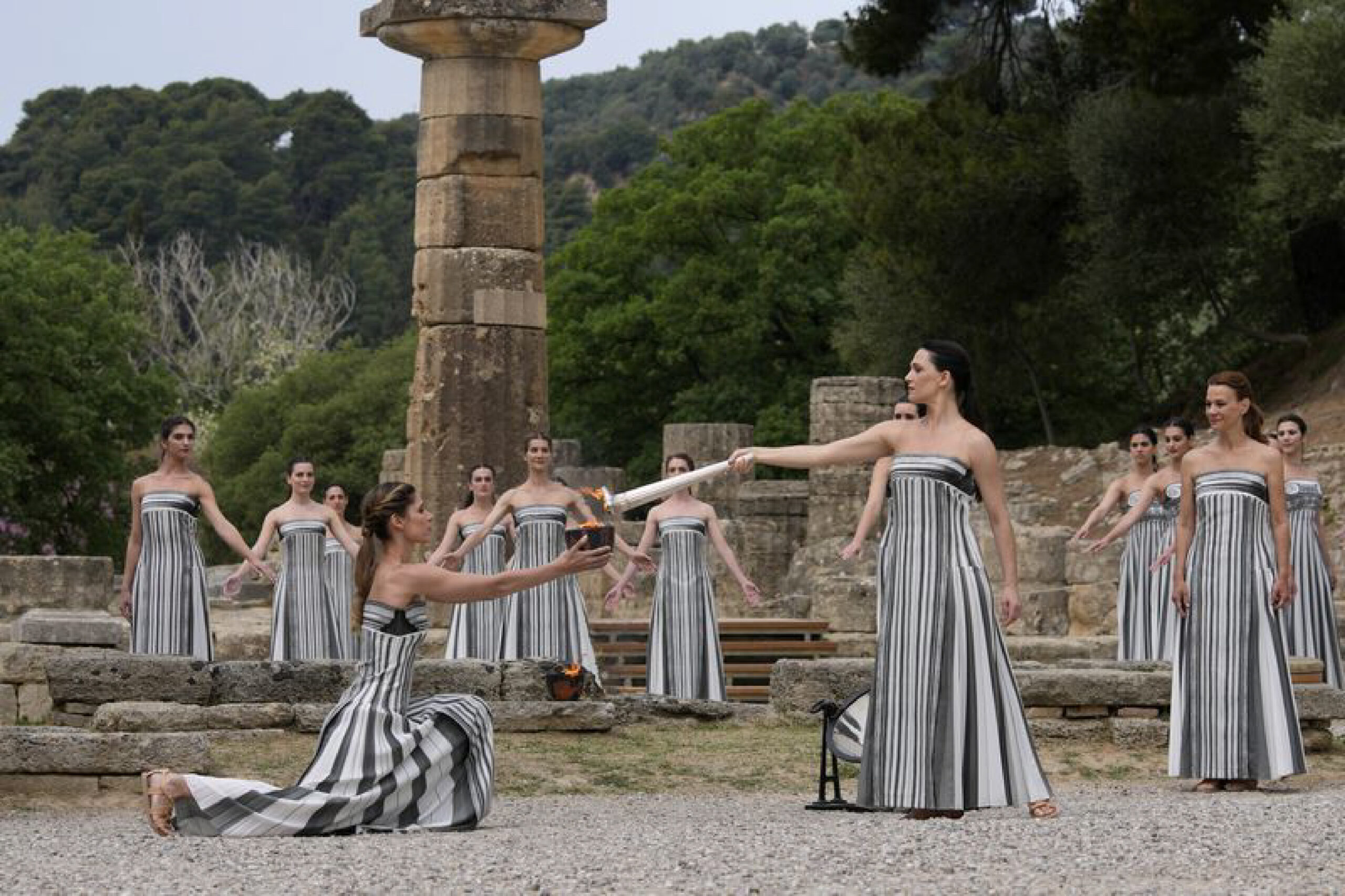Even without the help of Apollo, the flame that is to burn at the Paris Olympics was kindled on Tuesday at the site of the ancient games in southern Greece.
Cloudy skies prevented the traditional lighting, when an actress dressed as an ancient Greek priestess uses the sun to ignite a silver torch — after offering up a symbolic prayer to Apollo, the ancient Greek sun god.
Instead, she used a backup flame that had been lit on the same spot Monday, during the final rehearsal.

Normally, the foremost of a group of priestesses in long, pleated dresses dips the fuel-filled torch into a parabolic mirror which focuses the sun’s rays on it, and fire spurts forth.
But this time she didn’t even try, going straight for the backup flame, kept in a copy of an ancient Greek pot. Ironically, a few minutes later the sun shone forth.
From the ancient stadium in Olympia, a relay of torchbearers will carry the flame along a 5,000-kilometre route through Greece, including several islands, until the handover to Paris Games organisers in Athens on April 26.
International Olympic Committee President Thomas Bach said the flame lighting combined “a pilgrimage to our past in ancient Olympia, and an act of faith in our future.”

“In these difficult times … with wars and conflicts on the rise, people are fed up with all the hate, the aggression and negative news,” he said.
“We are longing for something which brings us together; something that is unifying; something that gives us hope.”
Thousands of spectators from all over the world packed Olympia for Tuesday’s event amid the ruined temples and sports grounds where the ancient games were held from 776 BC – 393 AD.
The sprawling site, in a lush valley by the confluence of two rivers, is at its prettiest in the spring, teeming with pink-flowering Judas trees, small blue irises and the occasional red anemone.

Greek authorities maintained high security around Olympia on Tuesday, after protests by rights activists disrupted the lighting ceremonies for the Beijing summer and winter games.
Armed police stopped incoming vehicles and checked for explosives, while sniffer dogs combed the grounds.
The first torchbearer was Greek rower Stefanos Douskos, a gold medalist in 2021 in Tokyo. He ran to a nearby monument that contains the heart of French Baron Pierre de Coubertin, the driving force behind the modern revival of the games.
The next runner was Laure Manaudou, a French swimmer who won three medals at Athens in 2004. She handed over to senior European Union official Margaritis Schinas, a Greek.

The IOC’s Bach praised Paris organisers for doing “an outstanding job” with preparations for the July 26 – August 11 games.
He also highlighted their environmental impact, saying that cleanup efforts will make it possible to swim in the River Seine, which traverses Paris, “for the first time in a hundred years.”
IOC politics briefly reared their head in Olympia as well, with the heads of two sports federations criticising track and field leader Sebastian Coe for breaking with Olympic tradition last week by promising prize money of $US50,000 ($78,000) to each of its gold medalists in Paris. The money will be paid from the share of Olympic games revenues that the IOC pays governing bodies of Olympic sports.
International Cycling Union President David Lappartient complained that Coe did not consult with other sports before announcing his move.

“We really believe that that’s not the Olympic spirit,” Lappartient said.
“If we concentrate the money … on only top athletes, only gold, then of course a lot of opportunities will disappear for athletes all over the world.”
Coe has been widely expected to run for the IOC presidency, which should become vacant in 2025. Lappartient is close to Bach and is increasingly seen as a potential successor.
From Greece, the Olympic flame will travel from Athens’ port of Piraeus on the Belem, a French three-masted sailing ship built in 1896 — the year of the first modern games in Athens.
According to Captain Aymeric Gibet, it’s due on May 8 in the southern French port of Marseille, a city founded by Greek colonists some 2600 years ago.

The Belem arrived in Katakolo, near Olympia, on Monday. Lookers-on included a small, enthusiastic group of tourists from the northwestern French region of Brittany, where the ship’s homeport of Nantes is, waving French and Breton flags.
“We thought it would be a unique opportunity to see the flame lighting at the historic site of Olympia,” said Jean-Michel Pasquet from Lorient, near Nantes.
“And when we also learnt the Belem would carry the flame … we said we must do this.”
But Pasquet said he’d have to watch the Paris Games from home.
“For us, it would be really very expensive, unaffordable,” to go to the venues, he said. “So we’ll watch them on television … from our armchairs.”
Source: 9News.com.au


